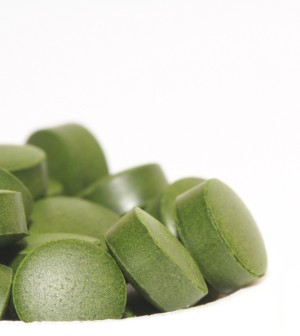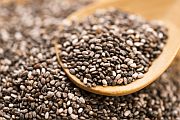- Could Your Grocery Store Meat Be Causing Recurring UTIs?
- Are You Making This Expensive Thermostat Error This Winter?
- Recognizing the Signs of Hypothyroidism
- 10 Strategies to Overcome Insomnia
- Could Artificial Sweeteners Be Aging the Brain Faster?
- Techniques for Soothing Your Nervous System
- Does the Water in Your House Smell Funny? Here’s Why
- Can a Daily Dose of Apple Cider Vinegar Actually Aid Weight Loss?
- 6 Health Beverages That Can Actually Spike Your Blood Sugar
- Treatment Options for Social Anxiety Disorder
Use Chia Seeds With Caution, Researcher Warns


Despite potential health benefits, chia seeds may pose a risk if they are not consumed properly, according to new research.
The tiny, oval seeds — a rich source of fiber, protein and heart-healthy omega-3 fatty acids — should not be eaten in their dry, raw form, experts cautioned. This is particularly true for people with a history of swallowing problems or a constricted esophagus, the researchers said.
“Chia seeds have the ability to absorb up to 27 times their weight in water,” said study author Dr. Rebecca Rawl, from Carolinas Medical Center in Charlotte, N.C.
“For this reason, patients with a history of [swallowing problems] or known esophageal strictures should be cautioned that chia seeds should only be consumed when they have had the ability to fully expand in liquid prior to ingestion,” Rawl said.
Use of chia seeds as a health food item has increased in recent years. When used properly, they’re safe, Rawl said.
Before eating the seeds, they should be mixed with enough liquid to allow them to expand, she said.
If chia seeds expand in the esophagus, the gel that forms may cause an obstruction, warns Rawl. Once the esophagus becomes impacted with chia seeds, removing them can be difficult using traditional tools, she noted.
What the researchers believe is the first case of such obstruction was to be presented Monday at the American College of Gastroenterology’s annual meeting in Philadelphia. It involved a 39-year-old man with a history of swallowing problems, asthma and seasonal allergies.
After eating a tablespoon of dry chia seeds with a glass of water, he developed trouble swallowing. Doctors who examined him in a nearby emergency room found a gel of wet chia seeds was blocking his esophagus, according to the researchers.
Attempts to remove the blockage using an adult diagnostic upper endoscope were unsuccessful. Other traditional tools also didn’t work. Doctors ultimately used a gastroscope made for premature infants to push small amounts of the chia seed gel into his stomach until the blockage was cleared, researchers reported.
Anyone who develops problems swallowing foods, beverages or saliva after eating chia seeds should seek medical treatment, Rawl added in an association news release.
Data and conclusions presented at meetings should be considered preliminary until published in a peer-reviewed medical journal.
More information
The American Society for Nutrition provides more information on chia seeds.
Source: HealthDay
Copyright © 2026 HealthDay. All rights reserved.










